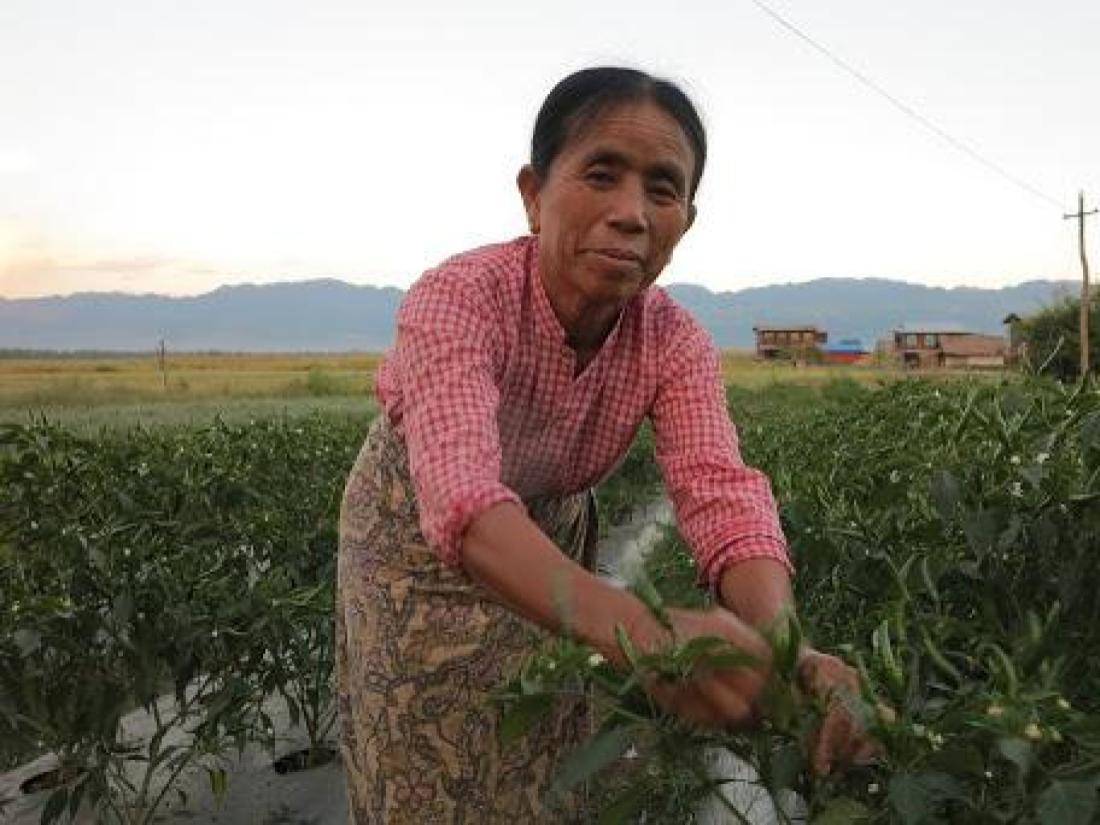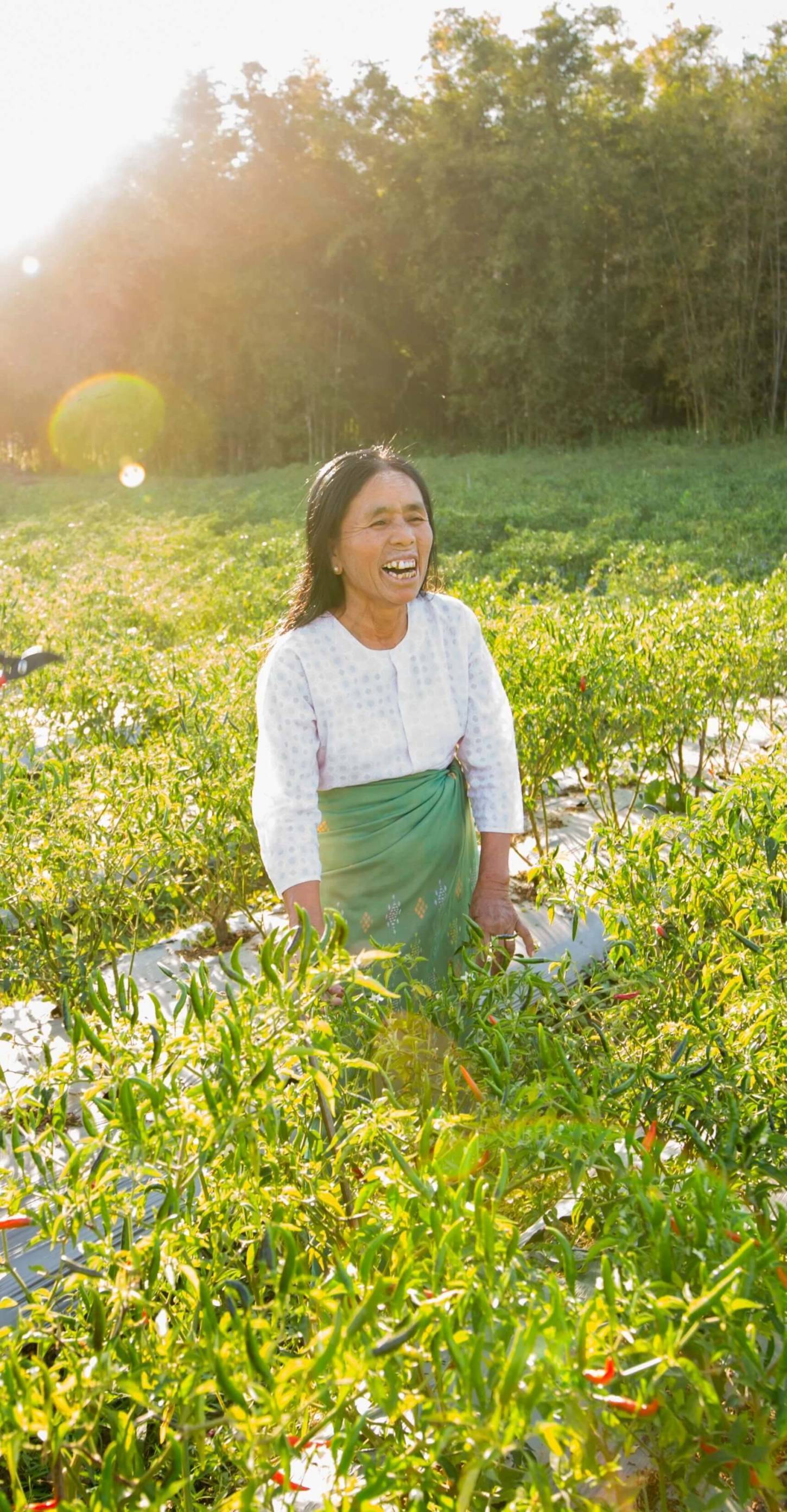Advancing women’s role in sustainable farming: going beyond slogans
Daw Mya Ngwe, 55, from Myanmar supports her family through vegetable farming. While she does not have children herself, she supports the children of her siblings especially with their education. Before she became a vegetable farmer, she grew field corn, sugarcane and flowers.

Then, a few years ago, she attended a training on profitable and sustainable farming techniques. She picked up simple techniques like using plastic mulch to prevent weeds. She started producing sweet pepper. Compared to sugarcane, for which she could only earn USD 310 per plot, Mya Ngwe is now able to earn more than double. One plot resulted in a net profit of USD 780, while the investment costs of both crops were relatively similar.
Mya Ngwe started to reinvest her additional income into growing more sweet pepper and has expanded her  farming business to hot pepper as well. She is able to offer more support to her nieces and nephews with their school fees. As often quite usual in Myanmar, Mya Ngwe always remembers to offer some of her earnings to the temple.
farming business to hot pepper as well. She is able to offer more support to her nieces and nephews with their school fees. As often quite usual in Myanmar, Mya Ngwe always remembers to offer some of her earnings to the temple.
The success story of Mya Ngwe is an inspiration and a model for development for many other women farmers in Myanmar. A project called “Advance Myanmar” aims to catalyze the creation of a commercial seed sector in the country’s Kayin State, with particular focus on female farmers.
The cooperation seeks to develop a new market for commercial seeds, develop the vegetable sector in Kayin State, Myanmar, and demonstrate the effectiveness of engaging female farmers in agri-business. Launched through a partnership between East-West Seed and MEDA, the project aims to build a commercial case for engaging women farmers as an effective shared value model for agri-businesses.
Why does ADVANCE Myanmar place an emphasis on female lead farmers?
The female lead farmer model employs the same methodology as the classic key farmer model employed by East-West Seed in all its Knowledge Transfer (KT) programs, but selects women farmers for training. Early research demonstrates that women farmers are more likely than male farmers to share learning with others in their community. ADVANCE Myanmar targets 90 lead farmers, of which 60 will be women, over the 2-year project period. They will be trained to improve their knowledge and practices in growing vegetables and forming new market linkages for the sale of their products.
The acknowledgement of women’s role in farming is not a new thing. There is a consensus among development experts of the need to create more opportunities for female farmers to contribute to sustainable farming systems. A recent report by the CGIAR concludes that increasing gender equity is a must-have to achieve sustainable intensification of agriculture. A UN study puts the spotlight on the role of women as custodians of sustainable traditional agricultural practices that maintain biodiversity, which holds the key to food security.
Gender was an added dimension in the recent Access to Seeds Index, where East-West Seed ranked #1 in the Global and South & Southeast Asia indices in 2019. This brings four straight top rankings for the Asia-based company, sustaining its good performance in 2016 when the first Seed Index was released and where East-West Seed led the pack in the Global Vegetable and East Africa indices.
Not just a nice slogan
Advancing the role of women in transforming agriculture is not just a nice slogan for East-West Seed. Actions have already taken place on the ground. Besides the ADVANCE Myanmar program, East-West Seed Knowledge Transfer has initiated a female-centered program in Assam State in India. The project team will develop approaches that are sensitive to gender dynamics and seek to empower women. The project team will adopt a deliberate “female-led farmer” approach, building from the experiences of Kayin State, Myanmar.
Article continues below
Do you want to help improve the lives of smallholder farmers?
Talk to us to enquire about a range of partnership possibilities, from project collaborations to dealerships and distribution.
In addition to stimulating economic development, the program is also focused on bringing concrete benefits to women who are largely marginalized from decision making and have less access to knowledge on improved production practices than men - despite being active workers in the field.
Its partner Mercy Corps brings a gender advisor to the project, who will advise the project team team on gender constraints and dynamics, tailoring training programs and materials accordingly. Also in India, EWS-KT has already piloted an innovative approach to bringing knowledge and inclusion to women engaged in vegetable farming in Odisha and Maharashtra.
Also in India, EWS-KT has already piloted an innovative approach to bringing knowledge and inclusion to women engaged in vegetable farming in Odisha and Maharashtra.
In the EWS-KT experience, men tend to dominate the majority of training events, and if women do join, they rarely participate actively, instead sitting quietly at the back.
However, as women are actively involved in field work, there is a need for greater inclusiveness.
To bring them in as active participants, EWS Knowledge Transfer has employed village ‘volunteers’; women villagers who are given training in extension techniques. EWS uses these positions to spread knowledge and to facilitate the organization of events.
The success of this approach is threefold; (1)The company carries out programs that focus on building the capacity of women smallholder farmers. Events organized have a gender balance and the women participants feel at ease to engage in discussions, (2) knowledge is shared widely through village networks - increasing the outreach of our work and (3) men readily accept, which has also led to an increase in the number of women key farmers.
As well as providing a useful function these village extension agents are proud of their position, so it is likely that they will continue.
While the ancient Chinese proverb says “women hold up half the sky”, it can also be said that women hold a big part of the land in their hands.
